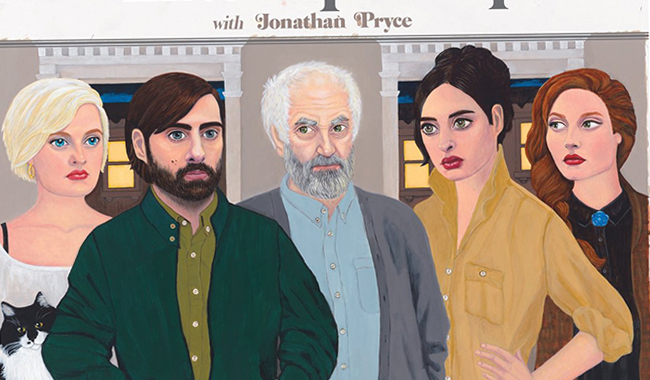
Listen Up Philip Review
 Jason Schwartzman plays Philip Lewis Friedman a young New York writer who in his own words has written one acclaimed book and is “accomplished but not successful”. It soon becomes apparent in his dropping of a girlfriend who arrives to their pre-arranged rendezvous late to which he roundly condemns her for her tardiness and manner while dumping her in the process, his meeting with an old wheelchair bound college friend whom he ceremoniously criticises as a loser and that he was always better that he is not a pleasant character. Philip is an arrogant, egotistical and obnoxious young man who thinks that he is on the verge of greatness. He goes to his publisher whom he also abuses and refuses to do any publicity for the book. We see Philip initially become involved in a fight with the photographer on how he should be shot before walking off; this scene is reminiscent of a more subtle scene with Bill Murray in Lost in Translation (2003) in which he is shot advertising a whiskey take after take. Here though, there are no redeeming features in Philip, only the bad mouth that he gives everyone, including the frank ‘honesty’ he gives his long suffering girlfriend Ashley (naturally played by Elizabeth Moss).
Jason Schwartzman plays Philip Lewis Friedman a young New York writer who in his own words has written one acclaimed book and is “accomplished but not successful”. It soon becomes apparent in his dropping of a girlfriend who arrives to their pre-arranged rendezvous late to which he roundly condemns her for her tardiness and manner while dumping her in the process, his meeting with an old wheelchair bound college friend whom he ceremoniously criticises as a loser and that he was always better that he is not a pleasant character. Philip is an arrogant, egotistical and obnoxious young man who thinks that he is on the verge of greatness. He goes to his publisher whom he also abuses and refuses to do any publicity for the book. We see Philip initially become involved in a fight with the photographer on how he should be shot before walking off; this scene is reminiscent of a more subtle scene with Bill Murray in Lost in Translation (2003) in which he is shot advertising a whiskey take after take. Here though, there are no redeeming features in Philip, only the bad mouth that he gives everyone, including the frank ‘honesty’ he gives his long suffering girlfriend Ashley (naturally played by Elizabeth Moss).
The only honour Philip bestows on anyone is on a writer who was popular and prolific in the 1970s and 80s, Ike Zimmerman (Jonathan Pryce), an equally misanthropic if somewhat wiser writer from a previous generation who has escaped to the country of upstate New York. Ike and Philip hit it off immediately and he invites the younger writer to come and stay with him for a prolonged period. Philip agrees and thinks nothing of telling his girlfriend that he intends to leave the city for the summer and expects her to still be there when he gets back.
Listen Up Philip is a rare gem in that it is solely focused on a literary man (without being a biography). There are not many films that have done this. If one thinks of both mid and late career Woody Allen he often would centre his film around similar characters. In fact many of the people who mix in Philip’s milieu, including himself are straight from Allen’s New York WASP set. Pryce’s character could well have appeared in Hannah and Her Sisters or any other similar film. Equally it is not easy to do a film where the central character is so obnoxious but remains funny. Indeed we laugh out loud at first at his frank honesty, but this soon wears thin and boorish. Like in the Allen films the women here seem to be attracted to this intellectual cruelty as we can see from the couple of women who fawn at Philip. With Yvette, the shy receptionist at the publisher’s we can assume that she may be filled with self-loathing to fall for his cruel words. Later, when Ike and an old friend invite some older, more experienced women back to Ike’s place they seem to fall for the same patter.
Released by Eureka! it seems bizarre that they should release the film under their Masters of Cinema banner given that this is director and film’s writer, Alan Ross Perry’s third feature, while neither of his other two previous films made any great impact. True, Listen Up Philip has received some loud applause and acclaim but it is perhaps too early to be labelling Perry a ‘master of cinema’. What the film is though is a master class of writing which of course is as it should be for a film about a writer that is perhaps doomed to some Freudian death wish through his bad personality. The films delivery is also of the Allen style with hand held cameras giving the action an up close, personal and intimate feel like a documentary. Equally much of the early part of the film is narrated, but not in the usual delivery but in a style that is more literary, as though the narrator were reading verse from a book, giving it a distinctive, poetic flavour.
The disc, as would be expected from Eureka! is replete with extras including a trailer, a making-of documentary, a comprehensive booklet, deleted scenes, an interview with a designer and a lengthy one hour interview with the director. Listen Up Philip is American indie cinema at its best and should prove to be a worthy cult fave.
Chris Hick
